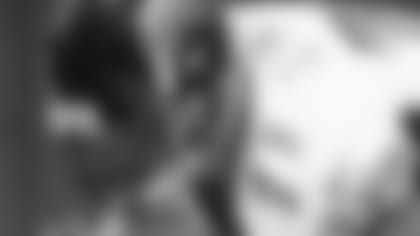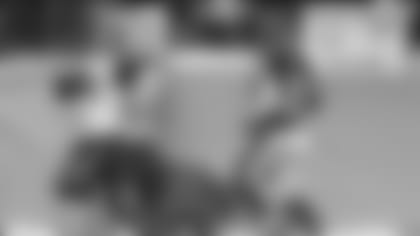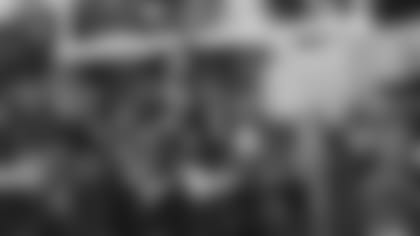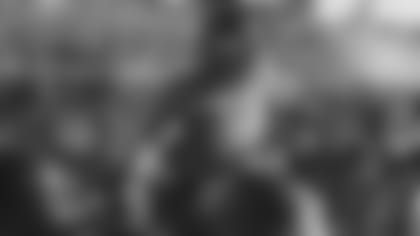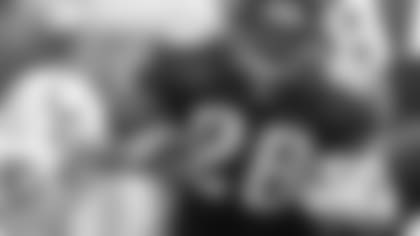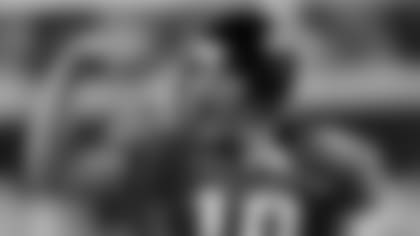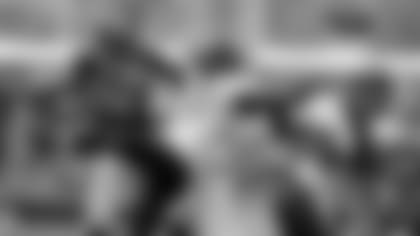Senior writer John Oehser's first-person look at 25 memorable games in Jaguars history continues with this look at a 30-27 win over the Buffalo Bills for the first postseason victory in franchise history
Date: December 28, 1996
Site: Rich Stadium; Orchard Park, N.Y.
Records entering game: Jaguars 9-7, Bills 10-6.
What happened: The Jaguars scored their first road playoff victory in their first-ever postseason game, upsetting the favored Bills by a score of 30-27 in an AFC Wild Card Playoff – and becoming the first road team to win a postseason game at Rich Stadium. The Jaguars struggled offensively early, and the Bills came out hot to take an early 7-0 lead. But a 20-yard interception return for a touchdown by defensive end Clyde Simmons and a fourth-and-1 stop of Bills quarterback Jim Kelly – along with a confidence-building 30-yard touchdown run by running back Natrone Means – helped Jacksonville maintain a 17-17 tie at halftime. With Jaguars second-year left tackle Tony Boselli's dominant performance against Hall of Fame defensive end Bruce Smith – the 1995 NFL Defensive Player of the Year – a growing storyline throughout the game, the Jaguars stayed close throughout the third quarter to set up a dramatic final period that would define a remarkable postseason run. Bills cornerback Jeff Burris' 38-yard interception return early in the fourth quarter made it 27-20, Buffalo, but the Jaguars drove 65 yards on the ensuing possession with quarterback Mark Brunell's two-yard touchdown pass to wide receiver Jimmy Smith tying it. The Jaguars knocked Kelly out of the game on the next series, with his lost fumble coming on what became the final play of a Hall-of-Fame career. Jaguars kicker Mike Hollis' 45-yard field goal caromed off the upright and through the goalposts, capping the ensuing series. The Jaguars' defense forced the Bills to go three-and-out on the next possession, and defensive end Tony Brackens forced a fumble by backup quarterback Todd Collins that linebacker Eddie Robinson recovered to secure the victory.
Jaguars leading passer: Brunell (18-33, 239 yards, one touchdown, two interceptions).
Jaguars leading rusher: Means (31 carries, 175 yards, one touchdown).
Jaguars leading receivers: Keenan McCardell (four receptions, 76 yards), Smith (five receptions, 58 yards, one touchdown), Pete Mitchell (three receptions, 64 yards).
Bills leading passer: Kelly (21-32, 239, one touchdown, no interceptions).
Bills leading rusher: Thurman Thomas (14 carries, 50 yards, one touchdown).
Bills leading receiver: Quinn Early (nine receptions, 122 yards).
The Jaguars entered the game as heavy underdogs. As right tackle Leon Searcy remembered it, it was the night before the game that the Jaguars began believing they could win.
Searcy: "[Center] Dave Widell took us to this wings spot – the whole offensive line. We were sitting around this table, all the O-Line, and we were like, 'We're going to win this ----.' For whatever reason, we just felt like we were in it. We were underdogs. Everybody had the Bills beating us, but I remember being at this wings spot with Boselli and the whole offensive line and we're going over the game plan. We're comparing notes and we're talking about it and I can't remember who said it, but somebody said, 'Were going to win this.' We never thought about that. We were in the game, but we never really talked about winning it. We were just like, 'We're in the playoffs. Now what?' Once someone said that, I was like, 'That's right. Yeah, we're going to win.' Now, the mood changed from being more tactical to where we started talking more ----. It was, 'We're going to whip his ass and his ass and his ass and we're going to run the ball with Natrone and we're going to protect Mark.' We won the game."
The Jaguars' status as underdogs may have helped a young team.
Defensive end Jeff Lageman: "Once we got into the playoffs, we were playing with house money. If you had asked everybody on that team, 'You can play in the playoffs, but because you're the upstart Jaguars you're not allowed to make any money in the playoffs' … we wouldn't have cared. It wouldn't have mattered. It was the playoffs. We didn't have a lot of playoff experience, so it was a big deal.''
While the Jaguars' victory the following week over the heavily favored Denver Broncos is perhaps better remembered, the Jaguars' victory over Buffalo was an enormous upset.
Brunell: "We were going to not just different weather conditions, but an entirely different climate. It's a miserable stadium. It was one of those games, 'All right. No one's giving us a chance. Let's see if we can string another one together. But this will be tougher than Atlanta. This will be tougher than Seattle. This is Jim Kelly. This is K-Gun. This is a Hall of Famer.' I remember us. I remember the team. I remember how cool it was that not only did we get here, but we won a playoff game. Going to Buffalo and beating Jim Kelly at their place … in some ways it was bigger than beating Denver. The odds were more against us beating Buffalo than beating Denver."
The Bills entered as 8.5-point favorites and were 9-0 in the postseason at Rich Stadium.
Linebacker Kevin Hardy: "Nobody thought we had a chance. For me personally, it was one of those moments: We're going to Buffalo and you've got Jim Kelly, Thurman Thomas, Bruce Smith … But once the game starts, all that goes out the window. It becomes another football game and you're playing."
Smith-Boselli was a major storyline entering the game. Smith at the time was already a Hall-of-Fame lock. Boselli had just made the Pro Bowl for the first time in his second NFL season.
Brunell: "All we heard all week was, 'Bruce Smith,' which was great for Tony. If you tell that dude he won't be able to block someone, he'll go kick someone's ass. That put him on the map. I think everybody knew Tony Boselli was good and could be great, but he wasn't great at the time. Nobody knew about him. That was a big game for Tony, and it was a big game for us."
Boselli: "That whole week I knew what I was up against. He (Smith) was Defensive Player of the Year. I knew who Bruce Smith was. I knew who he was in college. He was one of the best players ever. I started watching film and I said, 'My goodness … this is going to be tough.' I had a good year and I was one of the up-and-coming tackles and a good player, but I don't think anyone thought I was elite."
A week-long concern for Boselli: Smith's ability to force opposing tackles into false-start penalties.
Boselli: "The rule used to be defensive linemen could flinch and draw offensive linemen off. He [Smith] forced two or three (false start) penalties a game by flinching. It was constant. Every film, a guy would jump two or three times. I just remember all week [Head Coach Tom] Coughlin told [defensive end Tony] Brackens to do it in practice. I jumped offsides Wednesday and Thursday in practice like five times. Everyone's losing it, yelling at me. I'm like, 'This is going to be terrible.' I said, 'This is not going to work.' We were going silent count, so I'm trying to watch the ball and the defensive end at the same time and time the snap, but when I did that and he (Brackens) would flinch, I would go [false start]. I decided I was going to get to the line of scrimmage, find where he is, then look at the ball. I'm literally going to turn my head so I can't see him. I did in Friday's practice and it worked. I said, 'That's what I'm doing.'''
Mike Maser, the Jaguars' offensive line coach, found Boselli before the game and asked him, "What do you think? How do you feel?"
Boselli (Laughing): "I said, 'What do you think I think?' I said, 'He's a great player, but I'm going to block him.' I said, 'I'm not sure how yet, but I'm going to block him.' It was probably one of the most nervous pre-games I've had. We were in the playoffs and it was big for our franchise. I didn't want to be that guy to ruin the whole game. We walked out for warmups. It was packed already. The snow was on the sidelines. It wasn't freezing. It was in the 40s, but it was crisp. I walked out and the Bills fans were just dog-cussing me. They loved Bruce and they were saying, 'You're going to be Bruce's … fill in the words.' That went the whole warmups. They were just all over me. I started laughing, because what are you going to do?"
Boselli said the nerves continued early in the game.
Boselli: "All I could think was, 'Please give us good field position our first drive.' We didn't. We were on the 20, got a penalty and somehow we end up third-and-long – like on the 15. We're in the huddle and I'm thinking, 'OK, [offensive coordinator Kevin] Gilbride, let's call a screen or something. Or a draw. Just get out and we'll punt.'''
Instead, Gilbride called a pass play in an obvious passing situation that required Boselli to block Smith one-on-one. Boselli said there was no plan in the playbook that day to have backs or tight ends chip or help on Smith. As Boselli recalled, Gilbride the night before the game told Means and running back James Stewart, "On your way out [for a pass], if you get a chance, take a look at Bruce on the way out.'''
Boselli (laughing). "It was, 'Take a look at Bruce.' So, we call a protection where the backs go the opposite way. I'm going to be one-on-one by myself in shotgun with a seven-step drop and we're trying to throw the ball downfield. I remember hearing the huddle call and thinking, 'Oh, ----.' I got out of the huddle and I'm like, 'We're going to find out right now.' I looked at the ball, ball snapped, and I told myself, 'Just do your technique.' I did my technique and I blocked him. We didn't get the first down and I didn't care. I think it was incomplete. (Laughing) The (Bills) fans were cheering, and I wanted to start clapping for myself. It was like when defensive players are down by 50 and they make a tackle. I wanted to do the dance because I had blocked him. But in all seriousness, I jogged off the field and was like, 'I'm going to block him today.' From that moment on, I'm like, 'I'm blocking him the rest of the day.' There was no doubt in my mind I was going to block him."
Boselli held Smith without a sack.
Searcy: "I had no idea what Boselli was doing over there with Bruce. As far as know, as long as Mark is still standing up, we're doing a good job, so I was good with that. I was trying to block [Bills defensive end] Phil Hansen. It wasn't until I watched the film the next say that I saw what he was doing to Bruce. I was like, 'Damn, he's whipping Bruce's ass.'"
Means: "Tony Boselli … the job that he did on Bruce Smith that day was legendary and will probably go down as one of the great performances in playoff history as far as I'm concerned. He literally took a Hall of Famer and took him out of the game. That was big for us. We were able to execute."
Boselli: "It was huge. No one had blocked him that year. Everyone had game-planned him, so here comes this second-year player on this franchise that no one thought should be there with a bunch of no-name guys and this guy blocked him by himself. For me, individually it helped my confidence. I was pretty confident going in outside of being nervous as heck. But I was nervous every game. I don't think Bruce has talked to me to this day. He wouldn't shake my hand after the game. But to me, it's the ultimate compliment to him. He's a competitor, so he doesn't like being blocked and he makes excuses that I got help and everybody who watches film is like, 'What are you talking about?' But it's the ultimate compliment to him because it was such a big deal that someone blocked him. It meant a lot to my career. No doubt about it."
Boselli's dominance over Smith wasn't the only Jaguars storyline. Also big: the play of Simmons, a veteran defensive end who was acquired off waivers late in the '96 preseason. Simmons' 20-yard interception return not only tied the game early, it gave the Jaguars confidence.
Linebacker Kevin Hardy: "When he ran that in, it was another one of those moments where, 'Hey, we can do this.' Those are the kinds of plays, especially in the playoffs, that win games. They change everything."
Lageman: "It was a huge play. He just seemed to have a knack for that. He was one of the sneakiest, strongest, smoothest, seemingly-effortless players I was ever around. And a good guy."
It wasn't the first time Simmons had had such an influence in '96.
Hardy: "Clyde brought a sense of calmness. It sounds funny, but that was Clyde's persona and mentality. He was easy-going. He wasn't a rah-rah guy, or loud or in your face or hyped up. He was a calm, easy-going type guy. He kind of played the same way, but he made plays. Everybody knew it was a big moment, but at the same time you had guys like Clyde who made you understand, 'It's a football game; do what you've done to get yourself here and everything will take care of itself.' That's the mentality he brought to the team all year long."
Lageman: "Clyde was a veteran presence on a very young team. He was an old sage. It was fun to be around Clyde. He made it fun and he made it relaxing in a climate that Tom always wanted to make very tense. Clyde would go into practice and he would have his cap tucked in the back of his pants. He would be wearing Astroturf shoes for a grass practice in full pads and he doesn't care. I remember saying the first time, 'You're going to slip.' He said, 'I ain't going to move fast enough to slip.' But on game day … man, he could play."
Offensively, a major storyline was Means. Acquired off waivers the previous offseason, Means missed four games with a thumb injury and rushed for just 507 yards and two touchdowns in the regular season. But he rushed for 110 yards in the regular-season finale against Atlanta, and he was peaking for the postseason. And Coughlin told the offense all week running would be critical.
Means: "Coach Coughlin never let us get away from that. Even though we had big play guys on the outside with Jimmy and Keenan, Coach Coughlin was always hard on us about running the ball and being productive."
Searcy: "As an offensive line, we knew we had to play our part if we were going to win. It started with the running game. It started with us up front and we knew that. We knew if we were going to have a puncher's chance to win, we had to play well. The Bills had a good defense. Everyone talked about Bruce Smith, but Hansen – who I had to go up against – he was a handful, too. Then you had [linebacker] Cornelius Bennett. They always had a good, solid front seven. As an offensive line, we knew we weren't going to win a road game against Buffalo by throwing the ball. We knew we had to be solid up front to run the ball. If we put ourselves in a situation where we had to throw all the time, it was going to kill you."
Means against Buffalo had his most productive game in two seasons with the Jaguars, rushing for 175 yards and a touchdown on 31 carries.
Means: "It was really part of who we were. We had a power running game. We'd lock into 21 personnel and we would lean on some guys, some big bodies up front. We had a great offensive line. Things were kind of stalled early on, but that's part of it. Those one-, two- and three-yard runs eventually become the 62-yard run. We stuck with it."
Means' early 62-yard run set up a Jaguars second-quarter field goal and his 30-yard third-quarter touchdown run gave the Jaguars second-half momentum.
Means on the 62-yarder: "I'm a realist when it comes to my speed in football. I've always said that: if I could hit a hole clean, I felt like I could get there from about 50 or 60 yards. So having a 62-yard run was over my threshold. So, bouncing off somebody and still pulling off 62 yards, that in itself could be a minor miracle. I remember I squirted through and then it was like, 'Oh, I got through.' Those guys created a seam. I was able to find it and slip through."
Means on the 30-yarder: "We definitely thought that if the ball bounced our way, we were going to have a chance. But that run provided some momentum. On the sideline, guys just wanted to keep it going. Guys were like, 'Let's keep it going. Let's keep it going.' I remember that feeling in Buffalo: 'OK, let's keep it going.'"
The Jaguars weren't a picture of efficiency that day in Buffalo. They even pulled off a playoff rarity – rallying to win after Brunell threw a fourth-quarter pick-six.
Brunell: "I had a couple of picks, but the defense came up big. When you're young and stupid, you don't realize the magnitude of it. I'm not thinking, 'This game's over.' I'm thinking, 'All right … we've got another series so let's go compete and see what happens.' I was very fortunate that when I was young, I had that short-term memory. I had some bad games. It bothered me, but I never carried it over. If I threw a pick-six or had a bad game, the beauty of football is seven days later you get another chance. I learned so much in 1995 and 1996. There were tough lessons to learn, but I learned them because I really wanted to be good. It was important. I knew enough to know if I played well we had a chance because there were some players around me. But because I was young, there was a lot of growth that needed to take place."
Smith: "I don't think we were mature enough to realize we were supposed to be discouraged. We weren't supposed to be in the thing to begin with. When they found out they were in a dogfight, we could feel it during the course of the game. They got a play here or a play there, but we were coming back. After that pick-six, we got the ball and drove right back and scored. They had some good plays, but we were able to answer."
McCardell: "That was the thing about that team. I was like, 'Why not us? We're playing. They're playing. We're better than them.' We used to say that all the time. I said it all the time: 'Why not the Jags? Why not us? We didn't care about the winning streak Buffalo had. That was the last thing on our minds. All we knew was we had to contain Bruce Smith and we knew Tony was going to contain Bruce Smith. That's the kind of thought process we had. We had to put points on the board and keep their offense off the field and run the football. We knew that and went out and did that. We made the plays when we had to make the plays. There was nothing about the Buffalo tradition. We weren't worried about that. We knew we had to keep their offense off the field, contain Bruce, make plays when your time is called and run the football. Let's go."
Smith's game-tying touchdown came on a wide-receiver screen, scrapping and clawing to get into the end zone for one his biggest plays in what for him was a breakout 1996 season …
Smith: "It was a wide receiver screen. If you watch the tape, I'm just a little skinny body trying to find a little crease to get into the end zone."
As had been the case the previous week when the Jaguars beat the Falcons to make the playoffs, the postgame reaction was bedlam.
Safety Chris Hudson: "I remember my teammates, how happy we were. It was just like, 'We're doing it. Man, we're doing it.' It was a sense of growing at that time starting in Buffalo. I had a feeling of, 'Man, I can't believe we're still playing.' It was a feeling of being in the park as a kid, that 'can-we-stay-out-a-little-bit-longer' type feeling.' That's what I remember feeling. After that, it was like, 'Let's go to the next game.' It was just a feeling of happiness, of being on the playground.'''
And 23 years later, the memories live on.
Smith: "Coach Coughlin used to always say to us, 'Hang around in the fourth quarter and you give yourself a chance to win.' He drove that into us and for some reason we never got blown out of games. We were always in the game. They underestimated us as a team. They thought we were a bunch of young guys put together in the second year, but we went up there and had an amazing outcome."
Lageman: "That was their heyday and that to this day is still the loudest outdoor experience I've ever bene a part of. I just remember three things: Clyde Simmons … monster play; Natrone … rolling up Buffalo's defense; and Boselli kicking Bruce Smith's ass."


